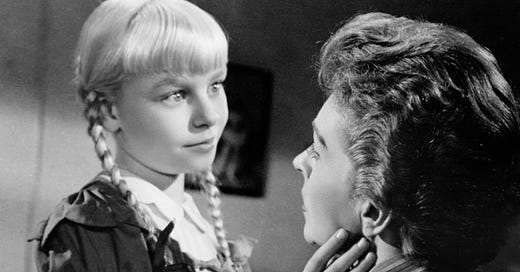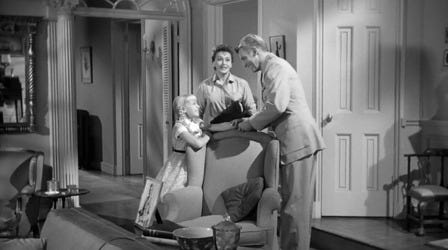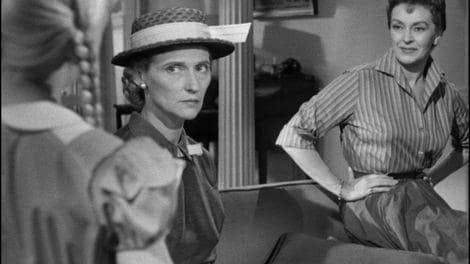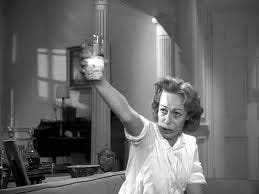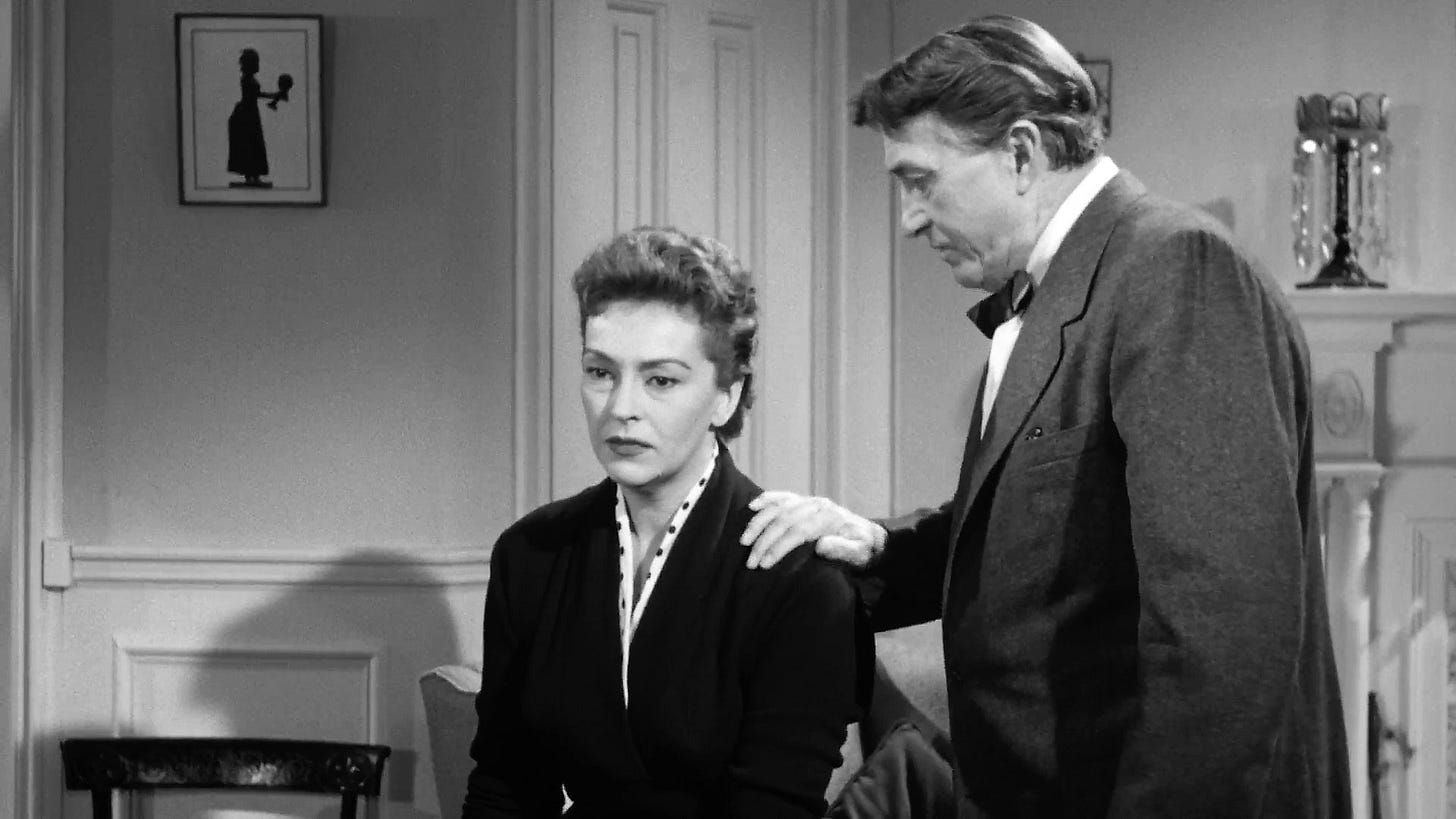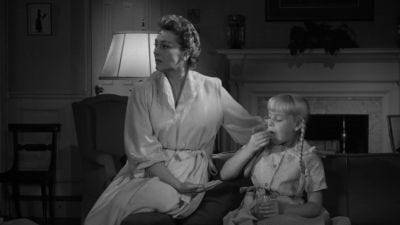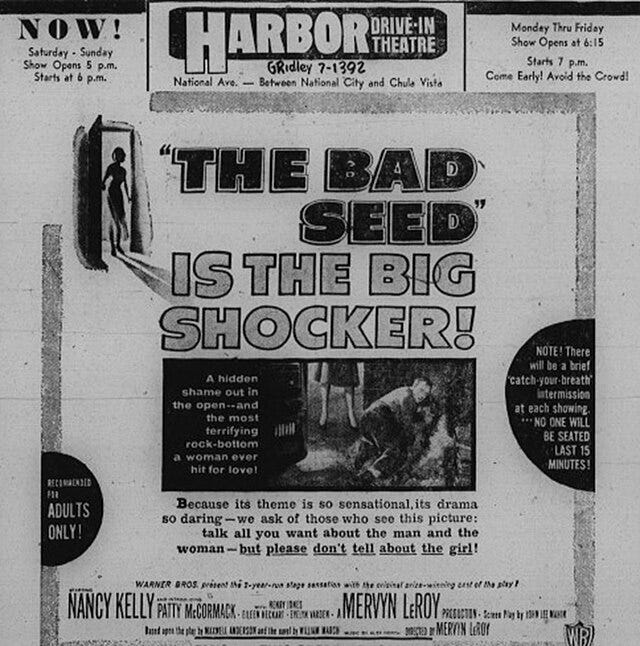The 1956 psychological thriller The Bad Seed, directed by Mervyn LeRoy, explores the disturbing case of a young girl named Rhoda Penmark. The film stars Nancy Kelly as Christine Penmark, Rhoda's mother, who gradually comes to suspect that her daughter (played by Patty McCormack) lacks empathy, remorse, and guilt, exhibiting manipulative and predatory behaviors that have led to multiple murders.
Despite the film's vintage, it still delivers a series of surprising hidden revelations that gradually lead Christine to the chilling realization of her daughter's true nature. For fans of psychological films and complex moral dilemmas, The Bad Seed remains a compelling viewing experience. After watching, consider leaving a comment to share your own insights and reactions on this unsettling exploration of inherited evil.
Rhoda Penmark, a sweet eight-year-old with braided pigtails, is exceptionally well-mannered and is always dressed in pristine party dresses. With sickly-sweet affection, the child endlessly charms her blissfully wedded parents, Col. Kenneth and Christine Penmark.
With Air Force Colonel Kenneth away at the Pentagon for weeks, his wife Christine and daughter Rhoda stay behind under the watchful eye of their middle-aged landlady, Monica Breedlove. Enthralled by Rhoda's charming idiosyncrasies and quaint demeanor, Monica showers the girl with gifts.
Rhoda's insatiable greed is on full display at the school picnic, where her selfish and entitled behavior is impossible to ignore. As the private school's gold penmanship medal, an accolade Rhoda desperately craves, is awarded to her classmate Claude Daigle, Rhoda's reaction is one of pure anger and willfulness.
Meanwhile, Christine’s afternoon luncheon with friends was shattered by the jarring radio report that young Claude Daigle had tragically drowned in the nearby lake. Christine's heart plummeted, her mind racing with how this devastating tragedy might impact her own daughter Rhoda, who had been present at the school picnic by the lake. Yet, Rhoda's demeanor as she returned home was profoundly unsettling, betraying no outward signs of the trauma that had unfolded.
Later, Rhoda's teacher, Miss Fern, visited Christine and revealed a troubling detail - Rhoda had been observed grabbing at Claude's prized penmanship medal moments before his untimely death. Miss Fern hinted at a potential connection between Rhoda and Claude's demise, going so far as to declare Rhoda unwelcome at the school going forward. The situation grew even more suspect when the distraught and inebriated Mrs. Daigle, Claude's mother, burst into Christine's apartment, angrily accusing Miss Fern and Christine of withholding information about her son’s death.
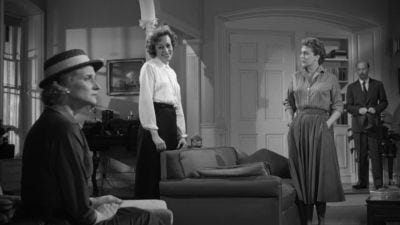
Ultimately, the damning evidence mounted when Christine discovered Claude's medal hidden in Rhoda's room. Pressed for an explanation, Rhoda claimed that Claude had gifted her the medal - a dubious assertion given the troubling details emerging around his tragic death.
Christine's father, Richard Bravo, visits and reveals to Christine that she was adopted and is the biological daughter of a notorious serial killer, a shocking and horrifying truth that shakes her to the core. Understandably, Christine worries that her genetic origins may be the root cause of her daughter Rhoda's sociopathic tendencies, fearing that such behavior is ingrained in her very nature. However, Richard tries to convince Christine that a person's upbringing and environment play a far greater role in shaping their personality and actions than their biological inheritance. As Christine grapples with the disturbing revelation about her family's sordid past, Richard implores her to remain steadfast in her role as a devoted mother, rather than allowing herself to be consumed by the ghastly truth of her genetic lineage to a notorious serial murderer.
Later, Christine catches Rhoda trying to dispose of her tap shoes in the household incinerator and realizes that Rhoda must have hit Claude with the shoes, which had left odd crescent-shaped marks on his face which Claude’s mother had explained were marks that could not be identified. Feigning tears and angrily blaming Claude, Rhoda admits that she killed the boy for his medal and confirms Christine's suspicions. Christine orders Rhoda to throw the shoes into the incinerator. Christine now faces a harrowing decision, torn between the impartial demands of justice and the profound bonds of maternal affection. The weight of this choice bears down upon her, a conflict challenging her to reconcile the irreconcilable.
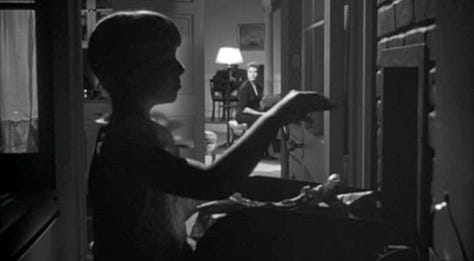
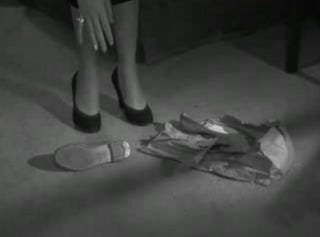
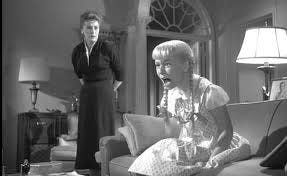
Leroy, the oddball neurotic building caretaker, noticed Rhoda had lost her tap shoes and tricked her into admitting she had burned them. Seeking to torment her further, he falsely claimed he had recovered them, only to have his malicious teasing expose the truth about Claude's death. Realizing Leroy now knew the truth, the desperate Rhoda retaliated by setting his bedding ablaze and locking him in the basement. Though Leroy was eventually freed, the damage was done - he emerged from the basement engulfed in flames, ultimately burning to death. Tragically, Christine and Monica witnessed his gruesome demise from the window, leaving Christine hysterical.
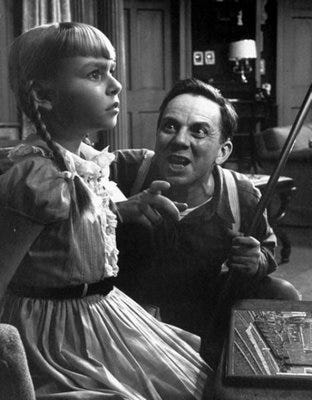
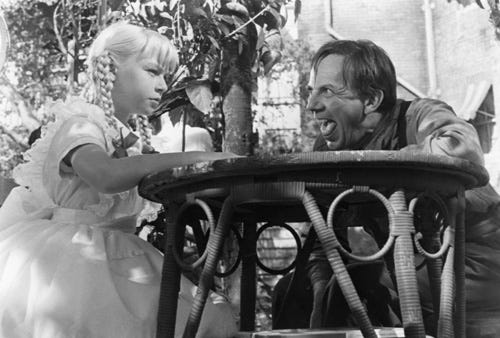
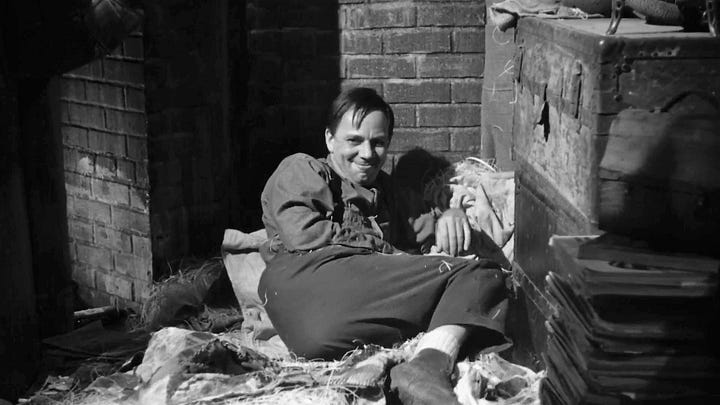
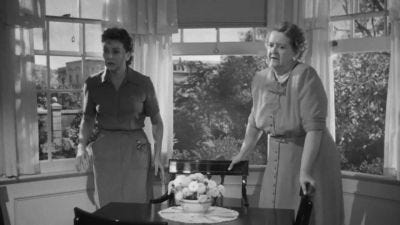
That night, a composed Christine tearfully confesses to Rhoda that she dropped the penmanship medal into the lake where Claude's lifeless body had been discovered. Distraught, Christine then proceeds to administer a lethal dose of sleeping pills to her daughter. In a desperate attempt to end her own life, Christine fires a gunshot to her head, but the sound alerts the neighbors. Fortunately, both Christine and Rhoda are rushed to the hospital and manage to survive, though Christine remains in a coma. Col. Kenneth Penmark arrives on the scene and takes Rhoda home.
Christine has regained consciousness and is expected to make a full recovery. She calls Kenneth, claiming she must pay for her "dreadful sin", he assures her they will work through their problems together. That same night, Rhoda recklessly sneaks away during a thunderstorm to retrieve the medal from the lake using a handheld scoop net. Tragically, a bolt of lightning strikes her, causing her death.
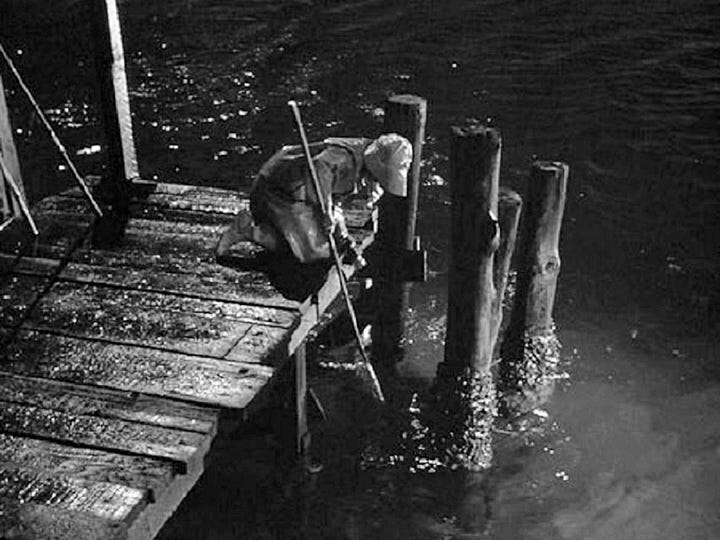

The Bad Seed is based upon the 1954 play of the same name by Maxwell Anderson, which in turn is based upon William March's 1954 novel of the same name. The screenplay was written by John Lee Mahin.
Directed by: Mervyn LeRoy
Cast:
Nancy Kelly as Christine Penmark
Patty McCormack as Rhoda Penmark
Henry Jones as Leroy Jessup
Eileen Heckart as Hortense Daigle
Evelyn Varden as Monica Breedlove
William Hopper as Col. Kenneth Penmark
Paul Fix as Richard Bravo
Joan Croydon as Claudia Fern
Golden Globe Award:
Eileen Heckart won for Best Supporting Actress
Patty McCormack nominated for Best Supporting Actress
Academy Awards:
Nancy Kelly nominated for Best Actress
Eileen Heckart and Patty McCormack nominated for Best Supporting Actress
Harold Rosson nominated for Best Cinematography
Interesting Notes:
The original novel and play concluded with Christine dying and Rhoda surviving. However, the Motion Picture Production Code at the time did not allow perpetrators of crime to go unpunished. As a result, the film adaptation reversed the fates of the mother and daughter - Christine's life was saved, while Rhoda was killed by a bolt of lightning. To further appease the censors, Warner Bros. added an "adults only" warning to the film's advertising. The shocking ending was also softened by a segment where an announcer introduced the cast, concluding with a lighthearted scene of Kelly's character, Rhoda, being spanked by McCormack's character Christine, for her misdeeds.
If you're a fan of mid-century cinema, this film is certainly worth your time. Though it bears the unmistakable stylistic hallmarks of the 1950s, it remains a compelling and well-acted piece. However, one recurring element may prove grating - the character of Rhoda has a habit of playing the piano right before and after committing or attempting to commit murder. Personally, I found this musical motif increasingly irritating, as I grew weary of the particular tune she would repeatedly play. Despite this one qualm, I believe this is still a solid, worthwhile film. The acting is superb, and the overall narrative is engaging enough to overcome the minor annoyance of Rhoda's piano playing. Overall, this is a solid cinematic offering.
Enjoy,
…Jill
The Forks Part…
Remember those messy, mouthwatering sloppy joes? Mmm, that tangy meat was practically begging to be paired with a side of crispy potato chips. Mom always kept a trusty can of Libby's (or later, Manwich) sloppy joe sauce stashed in the cabinet, ready to whip up this classic, retro dinner in a flash. Sloppy joes are a total cinch to make at home, no fancy canned sauce required - just the perfect meal for kicking back and watching a thriller like The Bad Seed! Get ready to dive in, napkins at the ready!
(pssst…there are no seeds in this recipe!)
Classic Sloppy Joes
What You Need:
1 teaspoon olive oil
1 pound ground beef
salt and pepper, to taste
1 tablespoon garlic powder
1 onion, chopped
1 green bell pepper, chopped
1 15-ounce can tomato sauce
1/4 cup ketchup
1 tablespoon worcestershire sauce
4 hamburger buns, toasted
What To Do:
Add the oil to a pan over medium high heat, add the beef, and break up with a wooden spoon.
Continue to break the meat into small pieces; add salt, pepper, garlic powder, onions, and peppers. Mix until well combined.
Stir the meat occasionally making sure all sides are browned. The meat is done when there is no longer any pink in the ground beef.
Stir in the tomato sauce, ketchup, and Worcestershire sauce. Let the mixture sit and thicken for 5 to 10 minutes.
Spoon ground beef mixture into the toasted buns and serve!
Feeling a little cheesy? Top that sandwich off with a sprinkle of shredded cheddar - the more the merrier! And if you're feeling frisky, go wild with some chopped onion, sliced tomato, or any other tasty toppings your heart desires. The sky's the limit when it comes to making this sandwich a masterpiece!
Enjoy!

